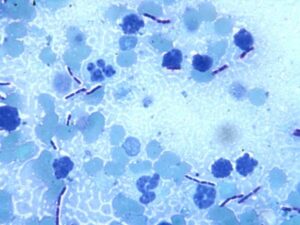Antimicrobial resistance (AMR) is a major global health threat that occurs when microorganisms, such as bacteria, viruses, and parasites, develop the ability to survive exposure to antimicrobial drugs, such as antibiotics, antivirals, and antimalarials. This can result in infections that are difficult or impossible to treat, leading to increased morbidity and mortality. AMR is a particular concern in low- and middle-income countries (LMICs), where access to effective antimicrobial drugs may be limited and infection control measures may be weaker.
Pakistan is one of many LMICs facing a significant burden of AMR. A number of studies have found high rates of AMR in various types of infections in Pakistan, including respiratory tract infections, urinary tract infections, and bloodstream infections. For example, a study conducted in Lahore, Pakistan found that nearly two-thirds of bacterial isolates from patients with respiratory tract infections were resistant to at least one type of antibiotic. Another study in Karachi found that more than half of bacterial isolates from patients with urinary tract infections were resistant to at least one type of antibiotic.

There are several factors contributing to the high levels of AMR in Pakistan. One major factor is the overuse and misuse of antimicrobials. Antimicrobials are often prescribed for conditions that do not require them, such as viral infections, or for a longer duration than necessary. This can lead to the development of resistant bacteria. In addition, antimicrobials are often available without a prescription in Pakistan, making it easy for individuals to self-medicate without seeking proper medical advice.
Another factor contributing to AMR in Pakistan is the lack of proper infection control measures in healthcare settings. Poor hand hygiene, inadequate sterilization of equipment, and overcrowding in hospitals and clinics can all contribute to the spread of resistant infections. Inadequate sanitation and hygiene in general population is also a major contributor in spread of resistant organisms. Furthermore, the high rate of antibiotic consumption in agriculture in Pakistan may also contribute to the development of AMR, as antimicrobials are used to promote growth and prevent disease in livestock. These antibiotics are often used in non-therapeutic ways, such as in feed additives, which can lead to the development of resistant bacteria in animals.
The consequences of AMR in Pakistan are significant. The increased morbidity and mortality associated with untreatable infections can have a negative impact on public health. In addition, the prolonged hospital stays and increased healthcare costs associated with treating resistant infections can place a strain on the healthcare system and lead to economic consequences, such as lost productivity. The economic burden of AMR is not limited to the healthcare system; it also includes the loss of productivity and income for individuals affected by resistant infections, as well as the cost of implementing measures to address AMR.

To address the issue of AMR in Pakistan, a multifaceted approach is needed. One important strategy is to reduce the unnecessary use of antimicrobials in both human and animal health. This can be achieved through improved prescribing practices and the promotion of vaccination to prevent infections that do not require antimicrobial treatment. In addition, improving infection control in healthcare settings, through measures such as proper hand hygiene and sterilization of equipment, can help to prevent the spread of resistant infections.
Developing and implementing antimicrobial stewardship programs, which aim to optimize the use of antimicrobials and preserve their effectiveness, can also be effective in mitigating AMR in Pakistan. These programs can include initiatives such as education and training for healthcare professionals on appropriate antimicrobial prescribing, guidelines for the use of antimicrobials, and regular monitoring and reporting of antimicrobial use and resistance patterns.
Regulating and monitoring antimicrobial use in agriculture can also play an important role in mitigating AMR in Pakistan. This could include implementing regulations on the use of antimicrobials in agriculture, such as requiring a prescription for their use and banning the use of certain antimicrobials in animals, as well as monitoring and enforcing compliance with these regulations. Additionally, promoting alternative methods of disease control, such as improved biosecurity measures and vaccination, can also help to reduce the need for antimicrobial use in agriculture.

Another important strategy for addressing AMR in Pakistan is to improve access to diagnostic tools for identifying resistant infections. This can include investing in new technologies, such as rapid diagnostic tests, and training healthcare workers on how to use these tools effectively.
Finally, raising awareness about AMR among the general public and policymakers is essential for addressing the issue in Pakistan. This can include educating the public about the appropriate use of antimicrobials, the risks associated with resistance, and the importance of infection control measures. It can also include engaging policymakers to prioritize AMR as a public health issue and to provide the necessary resources and support to combat it.

In conclusion, AMR is a pressing issue in Pakistan and addressing it is essential for improving public health and reducing the economic consequences of resistant infections. A multifaceted approach, including measures to reduce unnecessary antimicrobial use, improve infection control, regulate antimicrobial use in agriculture, improve access to diagnostic tools, and raising awareness, is needed to effectively mitigate AMR in Pakistan. Taking action now to address AMR in Pakistan can lead to long-term benefits, including better health outcomes and economic benefits. It is important to recognize that, addressing AMR is not the responsibility of healthcare system alone, it requires collaboration and cooperation among various sectors and stakeholders.



